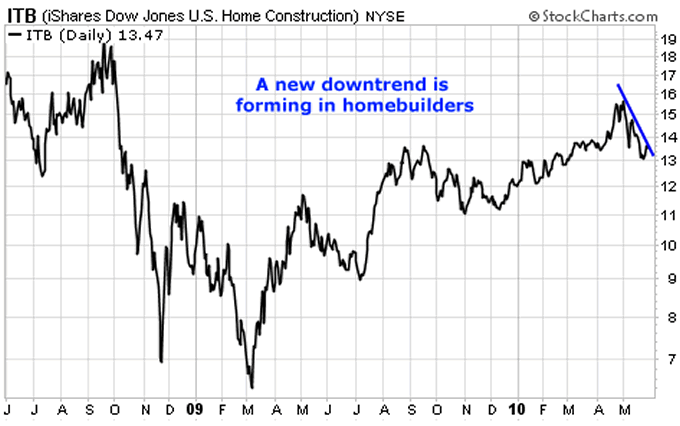Homebuilding Stocks Are in for a Nasty Surprise
Companies / Housing Stocks Jun 01, 2010 - 07:16 AM GMTBy: DailyWealth
 Tom Dyson writes: "You can't believe how screwed up things are down here... "
Tom Dyson writes: "You can't believe how screwed up things are down here... "
This weekend, I met up with a real estate expert, M, from South Florida. M specializes in REO. REO stands for "Real Estate Owned." Banks lend money to homeowners. Sometimes homeowners don't make their interest payments. The bank kicks the owner out and seizes the property. In the industry, they call this repossessed, bank-owned property "REO." The government is the nation's biggest holder of REO. M says the government owns 80% of the properties he deals with.
M says it's really hard selling houses right now. It's the government. They drag their feet on every sale and no one makes decisions. He made a sale last week. He said it took 18 months for the deal to close.
Then there are the checklists. The government uses a bureaucratic process for managing its property. Every time you miss one of the "boxes," the deal gets delayed another six months. M told me he recently got an e-mail from the Department of Veterans Affairs asking him to "winterize" all their properties. They wanted him to pour anti-freeze in all the toilets and insulate all the windows. They were going to pay him $300 per house.
"I told them to use some common sense. This is South Florida. Their houses don't need winterizing. They didn't care."
There's already a massive inventory of homes for sale in America. At the latest count, it's around 4 million houses. But partly because of the government's inefficiency at processing paperwork, there are almost 3 million households still in foreclosure and another 8 million households behind on their mortgage payments. Wall Street research I received this week predicts these "delinquent borrowers" will add another 5 million houses to the unsold inventory over the next two years.
It's true home sales have been rising. The problem is, this recent increase in real estate activity is temporary. The government has been giving $8,000 tax breaks to first-time home buyers and $6,500 tax credits to repeat home buyers. These tax breaks expired on April 30, 2010.
In short, anyone who wanted to buy a house over the next two years just bought a house before the April 30 deadline.
Now that there aren't any buyers left, activity in the housing market is going to plummet again. You can see this in the statistics for mortgage applications. Last week, the Mortgage Bankers Association announced mortgage applications had plummeted to their lowest level since April 1997... a 13-year low.
The problem is, when homebuilders see activity rising in the real estate markets, they build more houses...
Every month, the Commerce Department reports the number of new houses homebuilders start work on. They call this statistic "housing starts." In April, just as the tax credit was expiring, builders broke ground on new houses at a rate of 672,000 a year. This was a 5.8% increase over March levels and the highest level of housing starts in 18 months.
Builder confidence is a statistic compiled by the National Association of Homebuilders (NAHB). When builders are confident, it's likely they are preparing to build more houses. This statistic is a great indicator of the number of new home starts you can expect in the near future.
The NAHB released the homebuilder confidence reading two weeks ago. It showed builder's confidence rising to the highest levels in two years. With confidence rising to a two-year high, you can be sure homebuilders are preparing to build even more houses than they started in April.
In other words, homebuilders have been duped. They've ramped up production in response to housing activity that's about to disappear in a market that's super-saturated with existing houses.
The homebuilders' fund ITB rose 150% between March 2009 and April 2010. But it's recently formed a downtrend. With the wreckage that's about to occur in the homebuilding industry, it's a safe bet we're in for a nasty few months of falling homebuilder stocks.

There's another big selloff coming in homebuilding stocks. If you own any homebuilder stocks, you should sell them now. Experienced traders should consider opening short positions or buying put options on homebuilders.
Good investing,
Tom
The DailyWealth Investment Philosophy: In a nutshell, my investment philosophy is this: Buy things of extraordinary value at a time when nobody else wants them. Then sell when people are willing to pay any price. You see, at DailyWealth, we believe most investors take way too much risk. Our mission is to show you how to avoid risky investments, and how to avoid what the average investor is doing. I believe that you can make a lot of money – and do it safely – by simply doing the opposite of what is most popular.
Customer Service: 1-888-261-2693 – Copyright 2010 Stansberry & Associates Investment Research. All Rights Reserved. Protected by copyright laws of the United States and international treaties. This e-letter may only be used pursuant to the subscription agreement and any reproduction, copying, or redistribution (electronic or otherwise, including on the world wide web), in whole or in part, is strictly prohibited without the express written permission of Stansberry & Associates Investment Research, LLC. 1217 Saint Paul Street, Baltimore MD 21202
Disclaimer: The above is a matter of opinion provided for general information purposes only and is not intended as investment advice. Information and analysis above are derived from sources and utilising methods believed to be reliable, but we cannot accept responsibility for any losses you may incur as a result of this analysis. Individuals should consult with their personal financial advisors.
Daily Wealth Archive |
© 2005-2022 http://www.MarketOracle.co.uk - The Market Oracle is a FREE Daily Financial Markets Analysis & Forecasting online publication.



